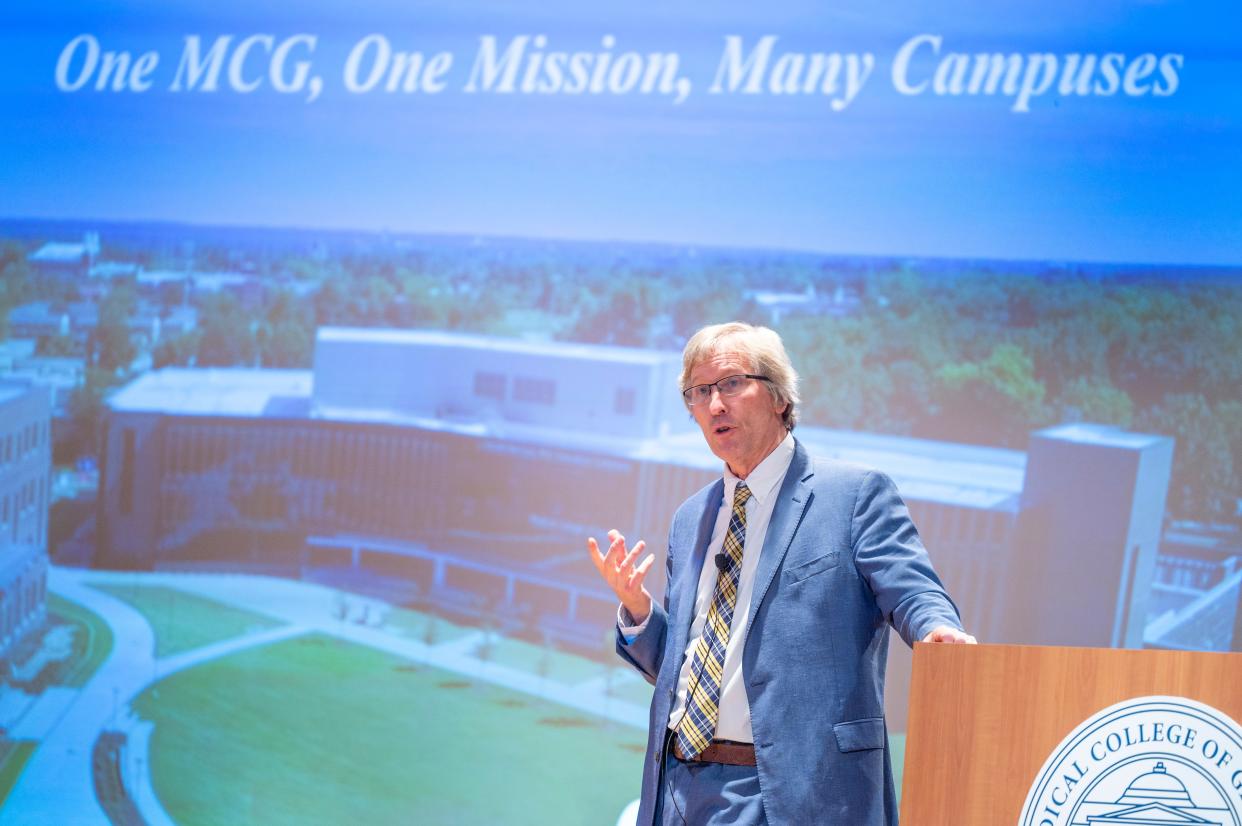Medical College of Georgia growing in students, statewide reach, now adding star recruits

Even as it adds students and extends its statewide reach, Medical College of Georgia at Augusta University is undersized for faculty and needs to grow, Dean David Hess said Friday.
Some big new hires and a new center should help with that, he said.
Hess gave his annual State of the College address on Friday that was also connected remotely to its regional campuses across the state: in Athens, Brunswick and Savannah, Albany and Rome. MCG has been strengthening ties with the Wellstar Health System in Atlanta with residencies and hopes to establish an Atlanta campus there soon, Hess said.
Continued growth and substantial goals
The school, which grew to 260 students for the first time this year, is in the second year of implementing its 3-plus program, where students would complete medical school in three years. For some of them, that fourth year will become a primary care residency in Georgia.
MCG also has its first eight scholars funded by a grant from Peach State Health Plan that would pay their tuition for two years if they agree to serve in an underserved area of the state. That is most of Georgia, outside some parts of Atlanta, Columbia County and Augusta and Savannah, Hess said.
"The rest of the state is underserved," he said. "And we're underserved in almost everything you can imagine."
Residencies, where medical students complete their training, cover many of those rural and underserved areas and MCG students have many options in Georgia, Hess said.
"We'd like to have a lot of our residents stay here but they can also go to other parts of the state," he said. Georgia is 39th in terms of physicians per capita and this is one way to address that.
Health news: AU research initiative looks for links between aging and inflammation
But the school is also looking to expand research to help meet a goal set by AU President to be among the top 60 in the country in funding from the National Institutes of Health by 2030. MCG has been between 70th and 73rd since 2000, Hess said.
But part of that is due to its size: it's one of just 49 medical schools with fewer than 700 faculty. Among those, MCG would be No. 2 in NIH funding behind only Tulane University, Hess said. MCG has 518 full-time clinical faculty compared to the nearby University of Alabama at Birmingham, which has 1,370 or the University of North Carolina-Chapel Hill, which has 1,825, while MCG has more medical students than either one.
"We've got great faculty," Hess said. "We just don't have enough of them."
Launch of Center for Immunology
But that could be changing quickly with some newly announced recruitments. Hess announced a new Center for Immunology that will be headed by prominent researchers (and husband and wife) Drs. Lynn Hedrick and Klaus Ley, who will serve as co-directors. The two were plucked from the prestigious La Jolla Institute of Immunology in California.

"These are some of the most renowned immunologists in the world," Hess said. The role of the immune system in multiple diseases has expanded dramatically in recent years, in everything from "COVID, cancer, atherosclerosis, autoimmune disease," he said. "It is central. And it is completely different than what I learned in medical school."
The new center will be hiring 20 faculty over the next five years as well collaborating with current faculty like Dr. David Munn, who helped discover a fundamental way the immune system can be turned off by tumors, which is now the basis for an immunotherapy approach for children with cancer.
Drs. Hedrick and Ley will be Georgia Research Alliance Eminent Scholars and will be joined by a third new GRA Eminent Scholar, Dr. Qin Wang from UAB, who researches therapeutics for Alzheimer's disease.
"I am extremely excited," Hess said.
This article originally appeared on Augusta Chronicle: Dean: New immunology center, star recruits helps fuel MCG's growth

